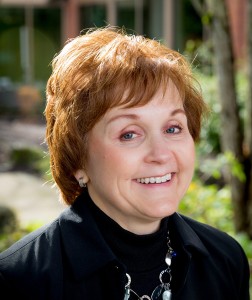Microsoft says it is planning to recruit more computer-savvy workers who have autism.
The move expands on an initiative launched eight months ago that has resulted in the recruitment of almost a dozen employees who are on the autism spectrum.

Mary Ellen Smith: “There are unique minds being underused and overlooked”
The computer software giant made the hiring process easier for candidates with ASD by offering a special interview process.
Rather than using exams or short, high-pressure interviews, candidates attend a two-week interview course where they participate in workshops, group collaboration projects and one-on-one sessions with staff.
The special interview process is the brainchild of Mary Ellen Smith, a vice president of worldwide operations at Microsoft who is also the mother of a son with autism.
‘Unique minds’
She said of the recruits with ASD who had already been hired: “These are people who may not be able to pass an initial interview or screen because their social skills might not be 100 percent in line with what’s expected in a typical interview, but what amazing talent are we missing as a result?
“There are unique minds being underused and overlooked.”
She added: “We started small by design so we can learn and make adjustments as we go.
‘A great experience’
“We want to be deliberate in everything we do – to make sure it’s a great experience for the job candidates, the new employees, and the teams and managers at Microsoft.”
One of the first recruits hired under the new process was Kyle Schwaneke, who has Asperger syndrome. He has been working as a software engineer helping to add Cortana, Microsoft’s voice-activated digital personal assistant, to the Xbox console.

Kyle Schwaneke: “I interviewed at a bunch of companies, but didn’t have any luck”
Before being hired, Schwaneke was a university graduate with a degree in computer programming and had worked for an indie game studio.
However, after that company closed down he was unemployed for a year and a half, despite going for job interviews.
‘Couldn’t give me feedback’
“I interviewed at a bunch of companies, but really didn’t have any luck,” he told Microsoft’s website.
“Sometimes, I would send in my resume and hear nothing. Other times, I’d go to an interview, and I’d think I did well, and then hear back I hadn’t done well – but they also couldn’t give me any feedback about it.”
His story highlights the extreme difficulties that people on the autism spectrum can have in finding and keeping a job – even when they have high-powered, relevant qualifications.
An estimated four out of five (80%) of people with an ASD are unemployed in the US. The proportion is even higher in the UK (85%).
Effort by Microsoft is a drop in the ocean
It means that the 11 people with ASD that Microsoft has hired over the past eight months are hardly even a proverbial drop in the ocean. If you add in the efforts of other technology companies such as SAP and Hewlett-Packard to recruit staff with autism it hardly alters a bleak picture.
Many more motivated autism parents such as Mary Ellen Smith are clearly needed to advocate for their children in order to force through changes that will help more young people with autism to gain employment.
When Smith’s son, Shawn, was diagnosed at the age of four, doctors told her that she and her husband needed to seriously limit their expectations for their toddler and what he could achieve because he had autism. Now, some 15 years later, he is is a college student who wants to be a marine biologist.
“It took us time to learn how to bring out the best of what he has to offer,” Smith said. “That’s the reason I’m so passionate about this.”
“My son has blown past all of whatever their definitions were of his capabilities, and so do a lot of kids.
“I think the more support someone is given, and the more we listen to what’s required to help them be successful, the more they’re going to blossom, grow and contribute. I’ve seen it time and time again.”
Published: 12 February 2016















